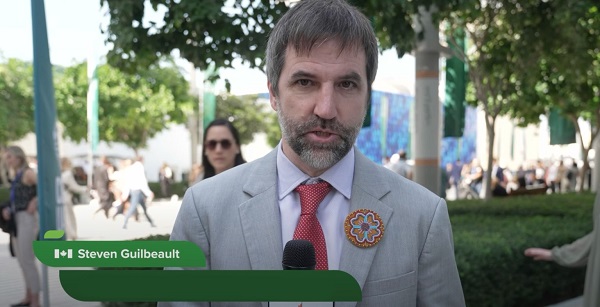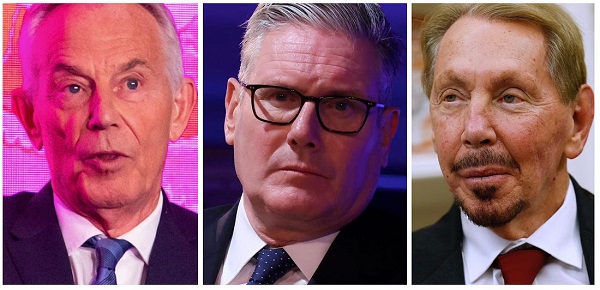Alberta
Will Carney’s Dazed & Confused Trade War Performance Target Canada’s Oil & Gas Industry?

From Energy Now
By Jim Warren
At first, the elbows up chicken dancers at Carney election rallies seemed harmless enough.
Post-election, they’ve become a menace.
The problem is being a patriotic chicken dancer does not mean one is also well informed about the fundamentals of economics and international trade. This partly explains why yesterday’s chicken dancers have become today’s cheerleaders for Ontario Premier Doug Ford and his plans for combating the Trump tariffs.
Ford supports a “get tough on the Americans” Team Canada response to our tariff problems. He imagines a pan-Canadian flourishing of hard-nosed patriotism whereby we punish the US with counter-tariffs and export taxes.
Ford wants us to pull together as flag waving Canadians and kick American butt, no matter how much it hurts us. Of particular concern to people from Alberta and Saskatchewan is eastern Canada’s fixation on applying export taxes on oil potash and uranium.
Ford’s approach amounts to a willingness to endure self-inflicted wounds to show the Americans we mean business. Come on patriots, circle the wagons and shoot in. Let the Americans know if they don’t eliminate those dastardly tariffs we will punch ourselves in the face some more. That’ll show ‘em.
Take potash for instance, food guru Sylvain Charlebois among other Eastern pundits has alerted us to the problems Canada could create for US agriculture by imposing punitive export taxes on Saskatchewan potash. That would indeed present a serious problem for American farmers, but not for long.
Prior to Putin’s invasion of Ukraine, Russia and its ally Belarus vied with Saskatchewan for the title “world’s largest potash producer”. Saskatchewan’s potash industry has done relatively well following the imposition of international sanctions on Russia and Belarus over their unprovoked aggression against Ukraine. (Belarus allowed Putin to assemble invasion forces on its territory.)
But guess what? Just as soon as we put an export tax on potash, Trump can be expected to waive the sanctions on Russia and Belarus and ensure US farmers aren’t starved for fertilizer. Conceivably it could take years for Saskatchewan producers to win back their American customers. Export taxes are a threat to the well-being of your own exporters—not merely a way to irritate your opponent in a trade war.
It is less likely, but possible, a similar fate would await Western Canada’s petroleum sector if export taxes were applied to the oil we sell to the U.S. It seems eminently plausible that if we taxed oil exports Trump would be tempted to seek out alternative sources in the international marketplace. Would he entertain removing sanctions on Russian oil for example? Admittedly, it would be a difficult problem for Americans to deal with.
But are Ford, his Team Canada cheerleaders and the federal government crazy enough to put oil revenues at risk? Crude oil remains the single most valuable commodity we export. Why would sane people put those revenues at risk? Unfortunately, after 10 years of Liberal government we have learned that when environmental zealots are in office they will happily sacrifice economic growth, jobs and prosperity on behalf of combating climate change.
It is easy for Doug Ford and the “patriots” to chicken dance to their hearts’ content if the cost of getting tough on the US is borne by oil, gas, potash and uranium producers from Saskatchewan and Alberta.
Tariff problems affecting the prairies took a turn for the worse on August 11 when China placed a 75% tariff on Canadian canola. Canada exports about $5 billion worth of canola in seed form, oil and meal to China. Saskatchewan and Alberta account for over three quarters of those exports.
Provincial politicians from the West have called on the prime minister to fast track discussions with China to resolve the dispute. China claims the new tariff is a reaction to Canada dumping canola produced by subsidized farmers. That’s a total fiction. The real reason is retaliation for the 100% tariff the Trudeau Liberals applied to Chinese EVs.
The Government of Canada, Canadian automakers and EV battery manufacturers have invested billions in developing the capacity to manufacture batteries (often unsuccessfully) and retooling assembly lines at auto plants.
Chinese government subsidies have been in large measure responsible for the incredible advances in Chinese EV technology. Chinese EVs are more technologically sophisticated, more energy efficient and far less expensive than EVs produced in Europe and North America—little wonder car makers in those regions have demanded their governments impose stiff tariffs on Chinese EV imports.
It’s clear that the Team Canada approach to fighting tariffs has run into a couple of significant snags. Teams Ontario and Quebec would be pleased to see export taxes applied to Western oil, gas, potash and uranium. The West will never agree to this.
At the same time prairie farmers would like to see the tariffs on Chinese EVs reduced or eliminated. Ontario and its thousands of auto workers can’t let that happen.
We can therefore expect to see a collapse in pan-Canadian cooperation.
It doesn’t require deep insight to predict who the winners and losers will eventually be. The Liberal government showed its hand several weeks ago when it passed legislation guaranteeing supply management for dairy and poultry farmers would never become a bargaining chip in trade negotiations. Supply management is a sacred institution in Quebec. La Belle Province has by far the most dairy farmers per capita of any province. Protecting those farmers is one of Quebec’s perennial demands.
As it happens, one of Donald Trump’s principal irritants when it comes to trading with Canada is the supply management system. He has identified it as one of the reasons he’s getting tough on trade with Canada.
When it comes to a prairies versus Ontario and/or Quebec quarrel, Westerners only rarely win.
It’s a Liberal tradition, keep the voters in Ontario and Quebec as happy as possible. So what if the West gets annoyed—they have no power in parliament. That’s why Liberal elections strategy is based on the maxim “Screw the West, we’ll take the rest.”
Alberta
Alberta’s E3 Lithium delivers first battery-grade lithium carbonate
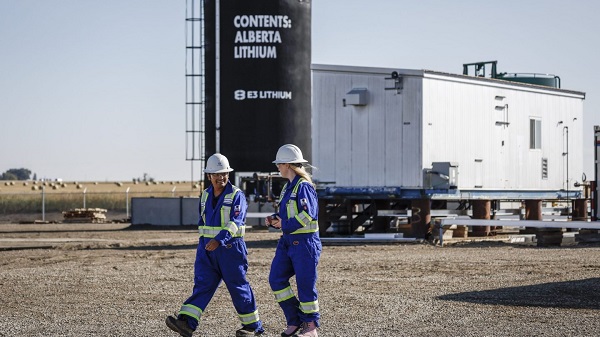
E3 Lithium employees walk through the company’s lithium pilot plant near Olds
From the Canadian Energy Centre
E3 Lithium milestone advances critical mineral for batteries and electrification
A new Alberta facility has produced its first battery-grade lithium carbonate, showcasing a technology that could unlock Canada’s largest resources of a critical mineral powering the evolving energy landscape.
In an unassuming quonset hut in a field near Olds, Calgary-based E3 Lithium’s demonstration plant uses technology to extract lithium from an ocean of “brine water” that has sat under Alberta’s landscape along with oil and gas for millions of years.
Lithium is one of six critical minerals the Government of Canada has prioritized for their potential to spur economic growth and their necessity as inputs for important products.
“The use for lithium is now mainly in batteries,” said E3 Lithium CEO Chris Doornbos.
“Everything we use in our daily lives that has a battery is now lithium ion: computers, phones, scooters, cars, battery storage, power walls in your house.”
Doornbos sees E3 as a new frontier in energy and mineral exploration in Alberta, using a resource that has long been there, sharing the geologic space with oil and gas.
“[Historically], oil and water came out together, and they separated the oil from the water,” he said.
“We don’t have oil. We take the lithium out of the water and put the water back.”
Lithium adds to Canada’s natural resource strength — the country’s reserves rank sixth in the world, according to Natural Resources Canada.
About 40 per cent of these reserves are in Alberta’s Bashaw District, home to the historic Leduc oilfield, where E3 built its new demonstration facility.
“It’s all in our Devonian rocks,” Doonbos said. “The Devonian Stack is a carbonate reef complex that would have looked like the Great Barrier Reef 400 million years ago. That’s where the lithium is.”
Funded in part by the Government of Canada and the Government of Alberta via Alberta Innovates and Emissions Reduction Alberta (ERA), the project aims to demonstrate that the Alberta reserve of lithium can be extracted and commercialized for battery production around the world.
E3 announced it had produced battery-grade lithium carbonate just over two weeks after commissioning began in early September.
In a statement, ERA celebrated the milestone of the opening of the facility as Alberta and Canada seek to find their place in the global race for more lithium as demand for the mineral increases.
“By supporting the first extraction facility in Olds, we’re helping reduce innovation risk, generate critical data, and pave the way for a commercial-scale lithium production right here in Alberta,” ERA said.
“The success from this significant project helps position Alberta as a global player in the critical minerals supply chain, driving the global electrification revolution with locally sourced lithium.”
With the first phase of the demonstration facility up and running, E3 has received regulatory permits to proceed with a second phase that involves drilling a production and injection well to confirm brine flow rates and reservoir characteristics. This will support designs for a full-scale commercial facility.
Lithium has been highlighted by the Alberta Energy Regulator (AER) as an emerging resource in the province.
The AER projects Alberta’s lithium output will grow from zero in 2024 to 12,300 tonnes by 2030 and nearly 15,000 tonnes by 2034. E3 believes it will beat these timeframes with the right access to project financing.
E3 has been able to leverage Alberta’s regulatory framework around the drilling of wells to expand into extraction of lithium brine.
“The regulator understands intimately what we are doing,” Doornbos said.
“They permit these types of wells and this type of operation every day. That’s a huge advantage to Alberta.”
Alberta
In Federal vs Provincial Battles, Ontario In No Longer A Great Ally For Alberta

Alberta Could Make A Deal With Bill Davis’ Ontario. Just One Problem.
Last month my friend Steve Paikin and I did a public appearance at the lovely Oshawa Town Square, recalling the highlights of our careers and the stories behind the stories. One of Steve’s stories was the subject of one of his 847 books, Bill Davis, the former premier of Ontario from 1971-1985.
He came to power the year our family moved to Ontario, so we watched his arc in power, from centrist Conservative to key figure in the interminable constitutional wrangles of the time. He typified a no-drama approach long before Barack Obama adopted it. His most controversial move was granting equal funding to Catholic schools. And smoking a pipe.
Which led me to ask Steve, the Most Ontario Man In The World, if it was still the same “place to stand, place to grow” province that Davis ruled. If anyone should know, the former TV Ontario stalwart was likely that person. Steve said that, generally, he felt that it was similar to what existed in the 70s and 80s. Obviously there were changes, but the mood was similar. After all, they’d elected Conservative Doug Ford three times.
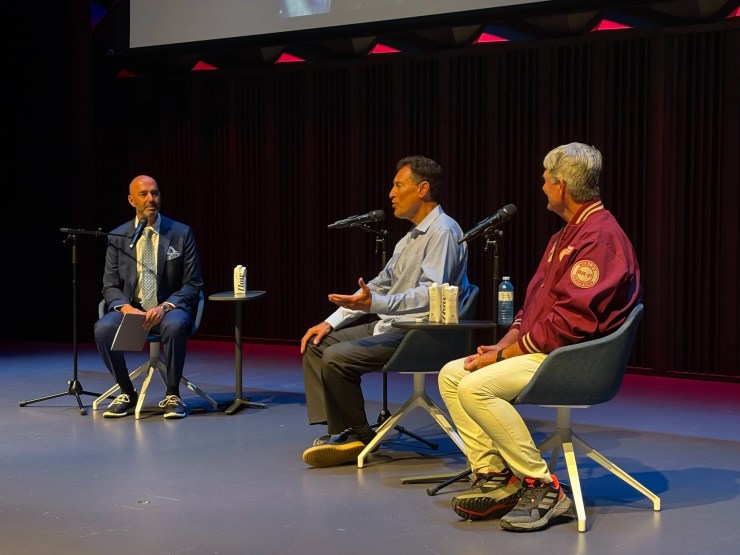
My response? That would make Alberta very happy. Alberta could make a deal with Bill Davis’ Ontario. Why? A Bill Davis Ontario would never tell another province to keep its oil in the ground, to hobble its economy to suit climate obsessions in his own province. A Bill Davis Ontario would support nation-building projects like trans-Canada pipelines not forcing Alberta to sell their oil at a discount to the U.S. A Bill Davis Ontario would never support gun seizures from law-abiding owners.
With respect, Steve, the Bill Davis Ontario is no more. There is no deal to be made at the moment. It is a place captured by the globalist fevers of Great Thunberg climate. It is a province in the thrall of liberal indigenous guilt marinated by its teachers and media. It is a province whose real-estate bubble is poisoning the national economy.
It is a province where politicians and leaders struggle to define a woman. Worst of all, Ontario returned an incompetent trust fund flibberty-gibbet not once, but three times as prime minister. The damage to the nation has been incalculable. Now they’ve elected his economic advisor.
And yet many of our Eastern friends believe that we are the ones who’ve have changed. They tell us we have drunk the cowboy Kool-aid and are now irredeemable. What they mean is, you’re become a traitor to your class. “Down the rabbit hole”. Cast out for being a Bill Davis centrist.
But we have not changed. Much of Alberta’s culture has not changed significantly, despite an NDP episode in government from 2012-15. Bill Davis, who died in 2021, would not find much change outside of the immigrants dropped on it by Justin Trudeau were he to visit today.
But eastern Canada? The whiplash changes might best be summed up by Vince Gasparro, the Liberal MP for a midtown Toronto riding, claiming that Canada’s economy is swell compared to other nations. To which the interim parliamentary budget officer Jason Jacques said just because someone else is 450 pounds and sick doesn’t mean an obese 350-pound person is healthy.

Forecasting a conservative $68.5 billion deficit, Jacques called the economy “unsustainable” and said the nation is at the precipice. “We’re at a point where, based upon our numbers, things cannot continue as they are, and I think everybody knows that,” Jacques said, He was immediately attacked by Liberal bot-world claiming he’s angling for a job with the Conservatives.
The closing of the Laurentian mind reflects what happened to the NDP, the party of Tommy Douglas. Once a national lean-left collection of union workers, farmers, culture figures and academics, it took its lead from the avuncular Ed Broadbent, Audrey McLaughlin and even Jack Layton. Socialist with a friendly face. The leaders calmed the Marxist fevers of their radical fringe.
Then, in the aftermath of Layton’s death, the party convulsed. The union workers and farmers were pushed out by radicals drunk on virtue. Under the DEI hire Jagmeet Singh they purged common sense, leaving Liberals to scoop up their less unhinged members. The survivors of Jagmeet wore keffiyehs in Parliament and predicted environmental doom. The party became irrelevant in 95 percent of the nation.
Their reward was a descent from 103 seats in the 2011 election to non-party status with just seven seats and six percent of the vote this year. While they make noises of relevance, they are now like the Monty Python “Bring out yer’ dead” skit in Search For The Holy Grail.
Which is gravy for the Carney Liberals who can now talk centre but govern as far left as it wishes. Which the Toronto Star says may soon include criminalizing residential school “denialism.” The author Michelle Good says that questioning the unsupported tales of murdered babies is just like “holocaust denial”.
The NDP collapse mirrors what is happening to the Democratic Party in the U.S. By design or by accident Donald Trump has bludgeoned them into assuming most of the policies that are now putting a torpedo into the NDP. Defending crime, endorsing unfettered illegal immigration, patronizing Hamas and other bad actors on the world stage, Balkan economics. Hollywood preening.
While the reviled Trump remains unrepentant, Democrats continue to sink in the polls. Married to California values they’re at 28 percent approval in the polls, and none of their potential 2028 presidential hopefuls is adding anyone to the base.
So the DEMs leadership intimidates its followers with this fatal equation, claiming to be the party of the future. There are a scarce few who remind their colleagues of what’s been lost. Pennsylvania senator John Fetterman who won his crucial seat despite enduring a stroke during the election run-up, is sounding warnings, however.

“Unchecked extreme rhetoric, like labels as Hitler or fascist, will foment more extreme outcomes,” Fetterman wrote. “Political violence is always wrong — no exceptions. We must all turn the temperature down.”
“Absolutely, it’s a reward for Hamas,” he said after Canada and other nations recognized a Palestinian state. “That’s going to be their narrative. They’re going to claim ‘That’s why we did 10/7. That birthed our nation,’ and I can’t ever give that to them.”

But his fellow party members are too engrossed in Jimmy Kimmel’s veneration at BlueSky, the Woke site, to notice that their base has deserted them. Canada’s liberals looking over the edge still get their reinforcement from like-minded people and a bribed media. But as Jacques says, the end is nigh, and everyone knows it.
Bruce Dowbiggin @dowbboy is the editor of Not The Public Broadcaster A two-time winner of the Gemini Award as Canada’s top television sports broadcaster, his new book Deal With It: The Trades That Stunned The NHL And Changed hockey is now available on Amazon. Inexact Science: The Six Most Compelling Draft Years In NHL History, his previous book with his son Evan, was voted the seventh-best professional hockey book of all time by bookauthority.org . His 2004 book Money Players was voted sixth best on the same list, and is available via brucedowbigginbooks.ca.
-

 Business2 days ago
Business2 days agoBill C-8 would allow minister to secretly cut off phone, Internet service
-
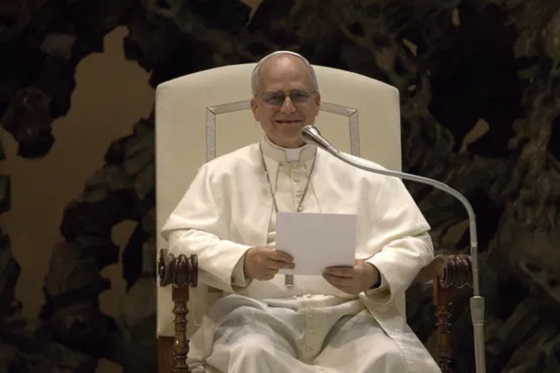
 International1 day ago
International1 day agoPope Leo hails Trump’s Gaza peace plan: “I hope Hamas will accept it”
-

 Business22 hours ago
Business22 hours agoCanada’s health-care system is not ‘free’—and we’re not getting good value for our money
-

 International2 days ago
International2 days agoNetanyahu hails TikTok takeover as Israel’s new ‘weapon’ in information war
-

 Crime1 day ago
Crime1 day agoDrug trafficker says Trump battle with the cartels is making an impact
-

 Business2 days ago
Business2 days agoElon Musk announces ‘Grokipedia’ project after Tucker Carlson highlights Wikipedia bias
-
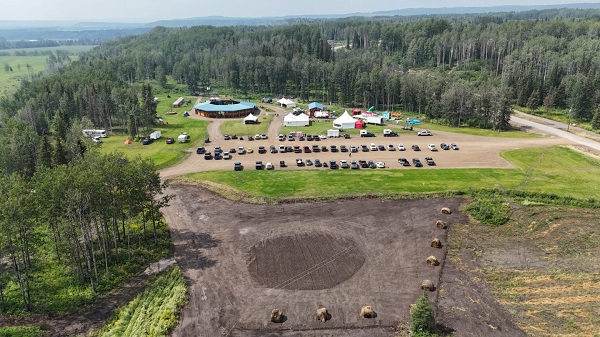
 Alberta2 days ago
Alberta2 days agoHalfway River First Nation makes history with Montney natural gas development deal
-
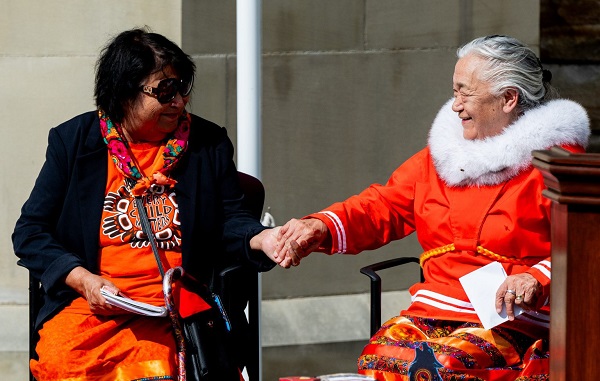
 Economy2 days ago
Economy2 days agoReconciliation means clearing the way for Indigenous leadership



